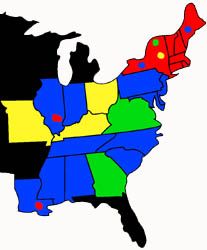Election 1824: Enter Andrew Jackson
In a feat never repeated (yet) Democratic-Republicans Jefferson, Madison, and Monroe completed three 2-term administrations in a row. Monroe did such a good job of bringing all sides together; the so-called “Era of Good Feelings” destroyed both the Federalist and Democratic-Republican parties. Everything was great. No one had any real issues to complain about or rally behind. What emerged were sectional leaders, who accepted the nomination of their home-state’s caucus.
The Contenders

(left to right)
Speaker of the House Henry Clay (KY) – Although he couldn’t just come out and say it, Henry Clay was a Hamiltonian who believed bigger government was the solution to all major problems. A master negotiator, he brokered the Missouri Compromise, which put the slavery issue in a drawer for nearly 30 years.
Senator, General Andrew Jackson (TN) –In the Battle of New Orleans, fought after the War of 1812 ended, Jackson kicked way more British ass than any battle during the war. He became an instant national celebrity. There was no question, this man was going to be President.
Secretary of State John Quincy Adams (MA) – Jefferson, Madison, and Monroe had all parlayed their time as Sec. of State to the presidency, so Adams seemed the natural successor. It didn't hurt that in 1820, he won the only electoral vote not awarded to President Monroe.
Secretary of the Treasury William H. Crawford (GA) – Crawford unsuccessfully ran against Monroe in 1816. His presidential ambition made him effective at his job but annoying to basically everyone.
The Fight
Despite some pretty major philosophical differences, all the candidates were publicly Jeffersonians. The contest would come down to personality. Jackson was the biggest figure to hit the American people since George Washington himself. John Quincy was the elite heir to the Adams family. Clay was the great orator of the Congress. Crawford had dared to take on the great James Monroe. Without formal political parties, it really was a free-for-all.
 Predictably, the sections of the country that nominated their candidates stuck to them on election day. Adams carried New England and New York; Clay found success in the West, and Crawford held his own in the South, even though he had suffered a debilitating stroke. Jackson was the only candidate to seriously cross regional lines. By a 15 vote margin, Jackson won a decisive plurality of electoral votes. Adams won 2nd, Crawford 3rd, and Clay 4th. That's right, Clay lost to a stroke victim. Since no one won a full majority, the results once again deferred to the House of Representatives.
Predictably, the sections of the country that nominated their candidates stuck to them on election day. Adams carried New England and New York; Clay found success in the West, and Crawford held his own in the South, even though he had suffered a debilitating stroke. Jackson was the only candidate to seriously cross regional lines. By a 15 vote margin, Jackson won a decisive plurality of electoral votes. Adams won 2nd, Crawford 3rd, and Clay 4th. That's right, Clay lost to a stroke victim. Since no one won a full majority, the results once again deferred to the House of Representatives.
The Constitution stated that the Congress would have to decide between the top three vote getters. The issue at hand was who would get Clay’s 37 electoral votes. Clay’s role as Speaker gave him a ridiculous amount of authority over these results. Rumor has it, he made a deal with Adams, which would explain how Clay ended up as President JQA’s Secretary of State. Jackson's pissed off supporters immediately cried fix, feeling their people's champion had been usurped by the big, scary, corrupt government.
The Title
Adams was a shittier politician than his father, and he was thrown into the most volatile political situation than, well, his father. He implemented massive internal improvements, which would have been perceived as benevolent if he could sell it that way. He couldn't. He was so hated, his own Vice President turned on him. He did, however, spend a lot of time swimming naked in the Potomac.
Jacksonsonians went and turned themselves into the Democratic Party. Crawford's running mate Martin Van Buren mobilized Democrats into an organized effort to undermine President Adams, villify Clay, and get Jackson elected in 1828. In 2 terms as president, he beat the shit out of everyone, destroying the Bank of the US, turning the army on South Carolina, and changing the presidency forever.
Crawford died 10 years later, a Georgia superior court judge.
Clay fucking hated Andrew Jackson. He thought the former general was a tyrant whose single-minded style of leadership would turn this great country into a dictatorship. After his failed run against Jackson in 1832, he established the Whig Party, which formed under the single goal of taking down Andrew Jackson. With a loser like Clay at the helm, it took a while for their platform to really gel.
Next Up – Election 1840: A Cult of Personality
The Contenders

(left to right)
Speaker of the House Henry Clay (KY) – Although he couldn’t just come out and say it, Henry Clay was a Hamiltonian who believed bigger government was the solution to all major problems. A master negotiator, he brokered the Missouri Compromise, which put the slavery issue in a drawer for nearly 30 years.
Senator, General Andrew Jackson (TN) –In the Battle of New Orleans, fought after the War of 1812 ended, Jackson kicked way more British ass than any battle during the war. He became an instant national celebrity. There was no question, this man was going to be President.
Secretary of State John Quincy Adams (MA) – Jefferson, Madison, and Monroe had all parlayed their time as Sec. of State to the presidency, so Adams seemed the natural successor. It didn't hurt that in 1820, he won the only electoral vote not awarded to President Monroe.
Secretary of the Treasury William H. Crawford (GA) – Crawford unsuccessfully ran against Monroe in 1816. His presidential ambition made him effective at his job but annoying to basically everyone.
The Fight
Despite some pretty major philosophical differences, all the candidates were publicly Jeffersonians. The contest would come down to personality. Jackson was the biggest figure to hit the American people since George Washington himself. John Quincy was the elite heir to the Adams family. Clay was the great orator of the Congress. Crawford had dared to take on the great James Monroe. Without formal political parties, it really was a free-for-all.
 Predictably, the sections of the country that nominated their candidates stuck to them on election day. Adams carried New England and New York; Clay found success in the West, and Crawford held his own in the South, even though he had suffered a debilitating stroke. Jackson was the only candidate to seriously cross regional lines. By a 15 vote margin, Jackson won a decisive plurality of electoral votes. Adams won 2nd, Crawford 3rd, and Clay 4th. That's right, Clay lost to a stroke victim. Since no one won a full majority, the results once again deferred to the House of Representatives.
Predictably, the sections of the country that nominated their candidates stuck to them on election day. Adams carried New England and New York; Clay found success in the West, and Crawford held his own in the South, even though he had suffered a debilitating stroke. Jackson was the only candidate to seriously cross regional lines. By a 15 vote margin, Jackson won a decisive plurality of electoral votes. Adams won 2nd, Crawford 3rd, and Clay 4th. That's right, Clay lost to a stroke victim. Since no one won a full majority, the results once again deferred to the House of Representatives.The Constitution stated that the Congress would have to decide between the top three vote getters. The issue at hand was who would get Clay’s 37 electoral votes. Clay’s role as Speaker gave him a ridiculous amount of authority over these results. Rumor has it, he made a deal with Adams, which would explain how Clay ended up as President JQA’s Secretary of State. Jackson's pissed off supporters immediately cried fix, feeling their people's champion had been usurped by the big, scary, corrupt government.
The Title
Adams was a shittier politician than his father, and he was thrown into the most volatile political situation than, well, his father. He implemented massive internal improvements, which would have been perceived as benevolent if he could sell it that way. He couldn't. He was so hated, his own Vice President turned on him. He did, however, spend a lot of time swimming naked in the Potomac.
Jacksonsonians went and turned themselves into the Democratic Party. Crawford's running mate Martin Van Buren mobilized Democrats into an organized effort to undermine President Adams, villify Clay, and get Jackson elected in 1828. In 2 terms as president, he beat the shit out of everyone, destroying the Bank of the US, turning the army on South Carolina, and changing the presidency forever.
Crawford died 10 years later, a Georgia superior court judge.
Clay fucking hated Andrew Jackson. He thought the former general was a tyrant whose single-minded style of leadership would turn this great country into a dictatorship. After his failed run against Jackson in 1832, he established the Whig Party, which formed under the single goal of taking down Andrew Jackson. With a loser like Clay at the helm, it took a while for their platform to really gel.
Next Up – Election 1840: A Cult of Personality
Labels: elections, presidents





 This blog is not to be taken seriously. Seriously. I take this seriously, but you shouldn't. You should do what you want, but you'll probably enjoy this more if you don't take anything I say seriously. I mean, I mean what I say, but it's not serious. Oh also, swearing is hilarious. It shouldn't be, but it is.
This blog is not to be taken seriously. Seriously. I take this seriously, but you shouldn't. You should do what you want, but you'll probably enjoy this more if you don't take anything I say seriously. I mean, I mean what I say, but it's not serious. Oh also, swearing is hilarious. It shouldn't be, but it is.


0 Comments:
Post a Comment
Subscribe to Post Comments [Atom]
<< Home